What makes content go viral, backed by research
What makes content go viral? According to our latest research, the key lies in triggering specific emotions, publishing at the right time and telling stories that resonate.
By understanding the emotional drivers behind viral content, brands can create campaigns that reach wider audiences and inspire real engagement.
The viral emotions driving brand engagement
Up to 70% of journalists say PR pros are important to the success of their jobs, yet 49% of journalists seldom or never respond to PR pitches, according to Muck Rack’s State of Journalism 2024.
So, where’s the disconnect? And how can your company stand out with newsworthy, viral content that drives valuable brand coverage and consumer engagement?
In 2013, Fractl (disclosure: I co-founded the agency) published a study on viral emotions in Harvard Business Review, analyzing the emotions that were activated when respondents viewed the top 100 images on Reddit r/pics from that year.
Then, respondents used Robert Plutchik’s “Wheel of Emotion” to label the emotions evoked by each image – helping us code the specific emotional interplay that drives viral content engagement.
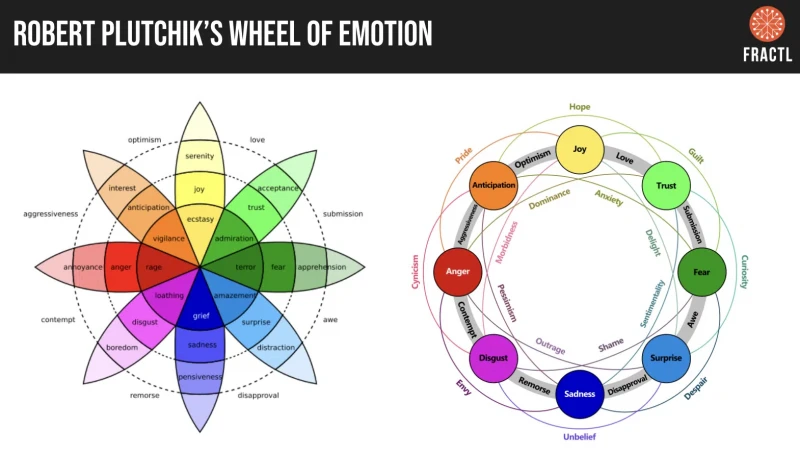
In our study, we discovered:
- Positive emotions were more prevalent in viral content than negative ones.
- Viral success occurred when negative emotions also triggered surprise.
- Emotions related to surprise were overwhelmingly present, including:
- Curiosity.
- Amazement.
- Interest.
- Astonishment.
- Uncertainty.
- Admiration was a highly common emotion in viral content.
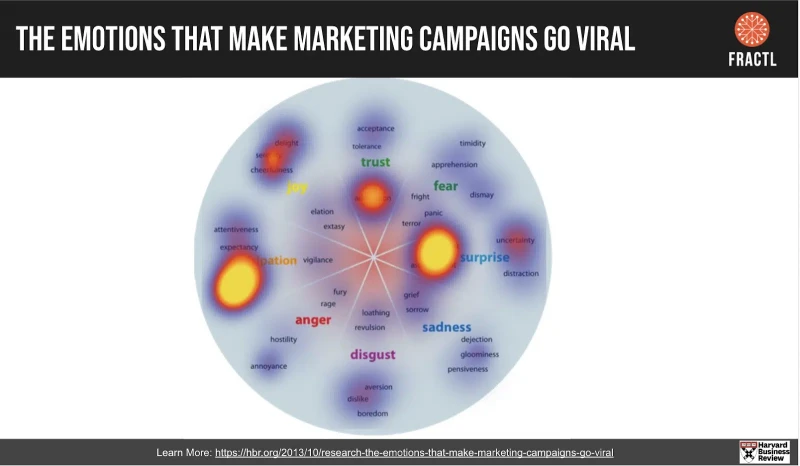
Ten years later, I set out to retest and expand our research (with Fractl co-founder Kristin Tynski), leveraging AI to further our understanding of the science behind viral content.
Applying the same methodology, we analyzed Reddit’s top 100 images on r/pics for 2024 and we (happily) revealed the same set of viral emotions (above).
Delving deeper, our new research found several other prominent levers marketers can adjust to increase their potential for virality:
- Emotional strength (40%): Posts with heightened emotional intensity draw more interaction.
- Timing (35%): What time a post is published plays a crucial role in its performance.
- Themes (25%): Specific narrative archetypes drive greater impacts.
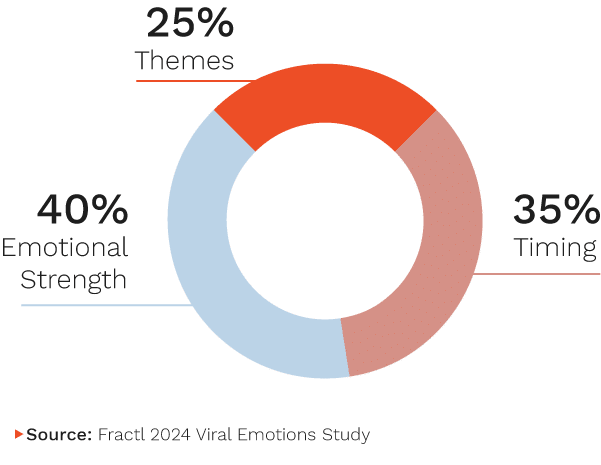
1. Content with heightened emotional intensity can increase engagement scores by up to 24%
Emotional resonance is the single largest contributor to engagement, accounting for nearly 40% of overall interaction.
Since emotional intensity drives engagement, your team needs to be focused on campaign ideas that will leave your target market saying, “Oh, wow, that’s really surprising!” not just “Oh, that’s interesting.”
The stronger the emotion, the greater the engagement.
High-arousal emotions – such as excitement, curiosity and surprise – are especially impactful, boosting engagement scores by as much as 24%.
Also, aim to evoke either curiosity or laughter with your content – reactions that prompt instant sharing.
Dig deeper: 5 ways to incorporate trends into your SEO content strategy
2. Evening hours have 24% more engagement than daytime hours
Our data shows that content syndicated to Reddit during late-night hours and on weekends garners significantly more engagement.
Late-night posts yield 15% higher scores, while weekend posts see an 18% increase in comments, underscoring the importance of timing.
This makes sense when you consider user behavior. During these times, people unwind and scroll through their feeds, and they are more likely to engage deeply with content.
Scheduling your highest-impact content for weekend, late-night Reddit promotion will help your brand reach consumers when they’re most likely to deeply engage with content.
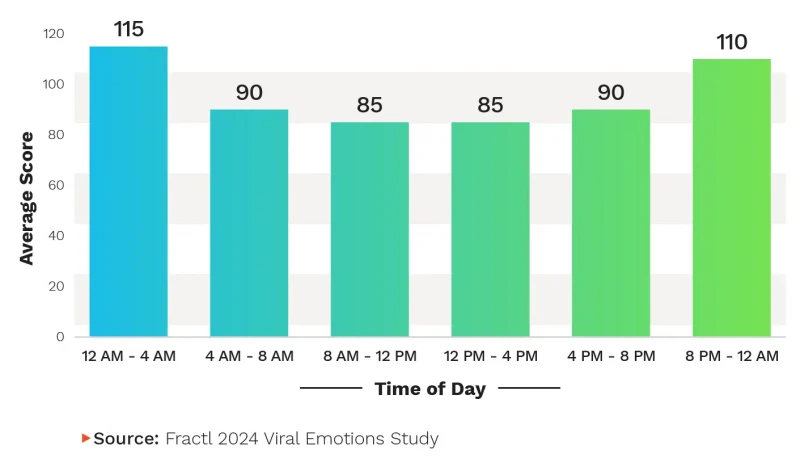
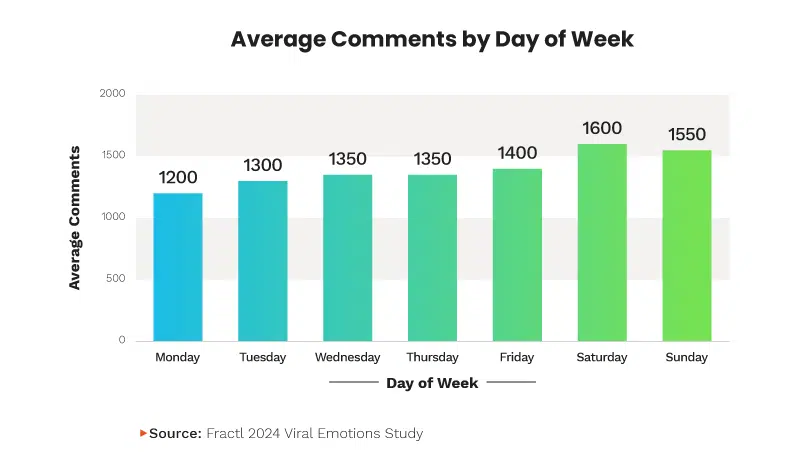
Based on our study, Reddit engagement peaked around 10 p.m. and again between 12 a.m. – 4 a.m. EST.
When you look across major time zones, this timeframe engages multiple markets at peak hours, as people tend to scroll on their phones most when they first wake up and again while winding down for bed.
Dig deeper: SEO beyond Google: Building your brand on Reddit, Quora, TikTok and more
3. Leveraging specific story archetypes increases engagement between 20-23%
People connect deeply with relatable, emotional stories that convey resilience, conflict and growth.
Story archetypes like “Triumph Over Adversity” and “Conflict-Driven Narratives” increased engagement scores between 20-23%.
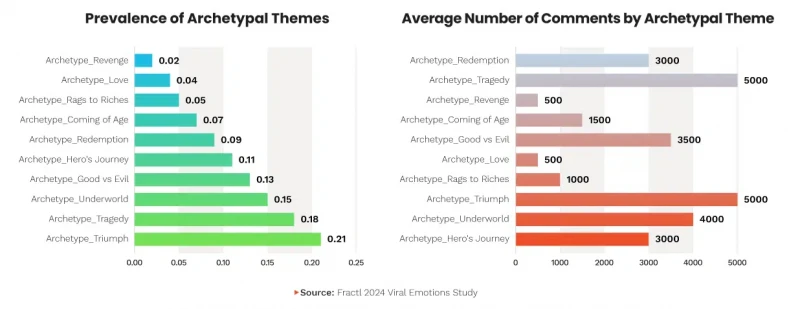
Stories following the “Hero’s Journey” and “Redemption Arc” create a transformational narrative, increasing comment interaction by 17%.
The journey of a character facing obstacles, experiencing growth and ultimately redeeming themselves encourages empathy and reflection, prompting more comments and discussion.
Conflict-driven themes earned 23% more comments, with themes like “Good vs. Evil” or stories of tragedy driving the most comments.
These narratives spark contrasting emotions like anger and sadness, pushing audiences to interact and voice their opinions.
DIg deeper: 5 behavioral strategies to make your content more engaging
How content marketers can leverage the science behind viral marketing
The best marketers understand the art and science of viral content creation lies in understanding your audience’s emotions and behaviors in relation to your services, products and industry.
- What would surprise them?
- What are they trying to overcome?
- How can your brand relate to them and help them problem-solve?
By consistently applying high-arousal emotional triggers, timing insights and impactful storytelling to your marketing content, you can create campaigns that reach, engage and convert your target market.
This small sample of headlines from our agency’s earned media illustrates how brands can create emotionally evocative, relatable content that earns viral, authoritative brand coverage, backlinks and engagement.
- Paychex: “Retirees Rejoining the Workforce”
- “How droves of employees are now being forced BACK to the workplace as inflation hammers their savings” – Daily Mail
- “1 in 6 Retirees Are Considering Going Back to Work” – Fool
- “This Is The Biggest Mistake We Make In Retirement Planning” – AARP
- “Baby Boomers: Your talent shortage secret weapon” – HR Morning
- “Tapping into tenure: Re-engaging retirees to fill skill shortages” – HRD Connect
- “8 In-Demand Jobs for Retirees and Seniors” – Go Banking Rates
- Consumer Affairs: “What is House Poor?”
- “69% of Homeowners Feel ‘House Poor.’ Did You Buy Too Much House?” – Motley Fool
- “Half of Americans consistently struggle to pay their bills on time, survey says” – Fox Business
- “Most American homeowners are ‘house poor’ – and 40% of them have taken second jobs to afford a mortgage, survey says” – Business Insider
- “25% of Homeowners Rely on Emergency Savings. Here’s Why You Need to Build Some Before Buying” – NASDAQ
- CouponFollow: “Top Cities to Thrift”
- “7 Common Myths About Shopping at Thrift Stores” – Go Banking Rates
- “Here Are the Designer Items That Resell the Best” – The Street
- “Home Decor You Should Thrift Instead of Buy New, According to Experts” – Real Simple
- “Thrift Shop Like a Pro: Your Guide to Scoring Great Secondhand Clothing” – The Penny Hoarder
Viral success isn’t accidental – it’s a deliberate approach to connecting with audiences on an emotional level.
Try these science-backed tips in your next marketing campaign and observe how your engagement metrics respond.
By focusing on the most impactful emotional and thematic drivers, you can create content that’s seen, shared and discussed widely.
Dig deeper: The complete guide to optimizing content for SEO (with checklist)